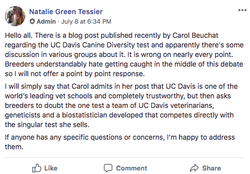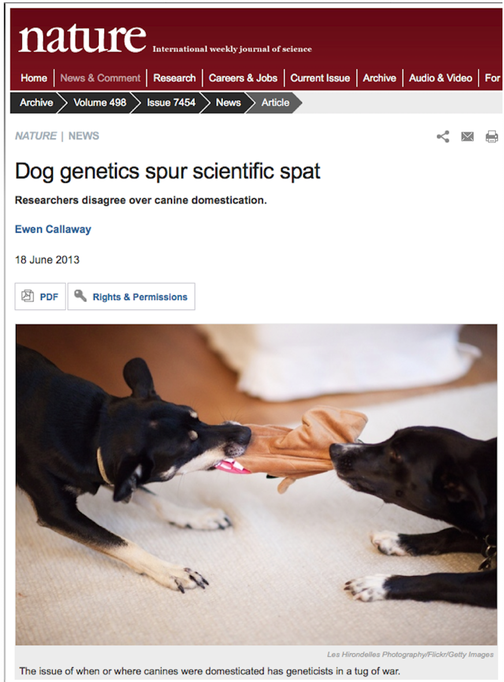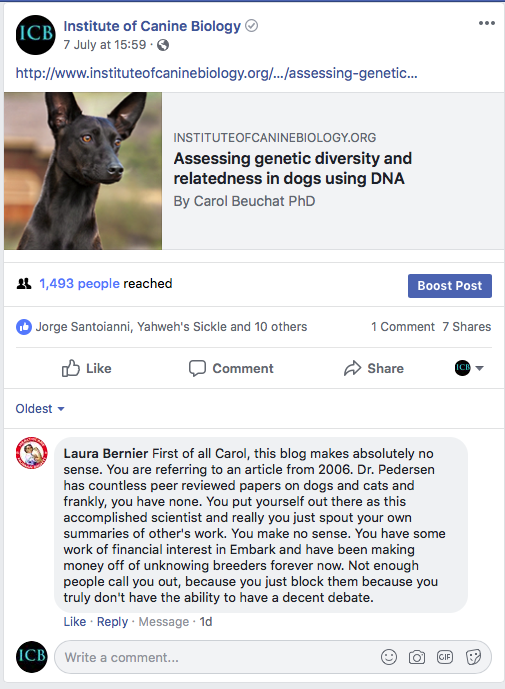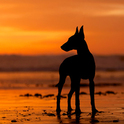You will have noticed that I presented direct quotes from the two papers noted above. I also provided a direct quote from published response by the authors of the first paper. It's important to note that the critical comments were not my opinion, scientific or even personal; they were from two groups of very well known canine population geneticists. I did suggest that the issues might be resolved with data validating the usefulness of the test, and until that is available I would view the test as flawed.
At the end of my blog, I made a big point of the fact that scientists have disagreements all the time, and a lot of the progress made in how we understand the world is the product of critical review and the resulting discussions. The concerns are published and the journal allows the other authors to respond. This is a normal and essential part of the scientific process. These are always civil, respectful debates. If you don't take criticism well, a career as a professional scientists is definitely not for you.
The current debate on the origin of dogs is a great example of various groups of scientists, each with different ideas, duking it out in the scientific literature, one publication at a time. This note in one of the world's most prestigious journals was published in 2013, and the lively debate still continues. I'm sure that sooner or later, we will figure it out and most scientists will come to a consensus. In the meantime, the critical comments of colleagues focus on details, data, assumptions, and methods. There are no personal attacks. Nobody's credentials are questioned. In fact, the scientists that engage in lively debate all know each other, consider themselves colleagues, and are likely to sit down for coffee when run into each other at meetings.
Science is a community of individuals that are committed to figuring out the truth, even if that means there might be winners and losers in the debate. This is the warp and woof of science, and the debate and process of ferreting out the truth is what I love about it.
I brought all this up in my blog - and emphasize it again here - because I expected that there might be some members of the dog community that would see the papers and even my blog post as some sort of personal attack on the Davis test. Clearly it was not. But yes, unfortunately, that is how some took it.
This person is associated with BetterBred, a company that is using the Davis test as an online breeding tool. She is known to me, because she has been trolling me for years now, as have a number of people associated with the group at BetterBred. She is not a scientist. She has no comments to make about the substance of my blog post.
I did try to make my post understandable to any breeder, from the lawyer and veterinarian to the dog groomer. But Laura Bernier notes (twice) that she didn't understand it, so her comments are not about the substance of that blog but are persona; her intent is apparently to sully my reputation. I've been a professional scientist for nearly 40 years, I have a long list of publications, a record of more than $1.2M in grant support, and the respect of my peers. Her belittling remarks will have not effect at all on my reputation, and they don't even keep me up at night, but I am concerned that she carries around so much anger. Stress isn't good for your health, and I truly hope she gets the help that she needs.

So, I have now decided to address this problem another way. I will post noxious comments made by anybody affiliated with BetterBred, including their clients, on my website. I will be liberal with links to the BetterBred site, so the curious can see for themselves the vitriol directed by BetterBred and their fans towards members of the canine scientific community. If the posts continue, I'll even set up a separate section on the ICB website where they can be catalogued and searched so that they show up in Google searches for BetterBred.
"Not enough people call you out, because you just block them because you truly don't have the ability to have a decent debate."
I actually find this one humorous under the circumstances. Considering.
Then a bit later, a dig about mental illness.
Again, they've been trolling me for years. Yet here I am. Still.
Today I get an email from BetterBred, this one some sort of "announcement", for which they have used a DISPOSABLE, TEMPORARY email address. You know, to avoid spam.
ICB's online courses
***************************************
Visit our Facebook Groups
ICB Institute of Canine Biology
...the latest canine news and research
ICB Breeding for the Future
...the science of animal breeding






